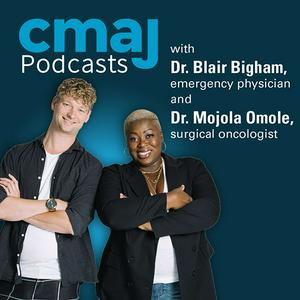Guideline on smoking cessation: what works in practice
Smoking remains the leading cause of preventable disease and death in Canada. A new clinical practice guideline published in CMAJ on tobacco smoking cessation outlines evidence-based behavioural and pharmacological interventions to help patients quit. On this episode of the CMAJ Podcast, Dr. Mojola Omole and Dr. Blair Bigham speak with Dr. Eddy Lang, co-author of the guideline, and Dr. Andrew Pipe, a pioneer in smoking cessation research and practice, about how clinicians can better support patients ready to stop smoking.Dr. Eddy Lang, an emergency physician and professor at the Cumming School of Medicine, describes how the Canadian Task Force on Preventive Health assessed a wide range of interventions to make sense of a complex evidence base. He outlines the strong recommendations in favour of pharmacological therapies such as nicotine replacement therapy, bupropion, varenicline, and cytosine, as well as behavioural interventions including counselling, group therapy, and quit lines. He also explains the conditional recommendation against e-cigarettes, citing limited long-term safety data and concerns about normalizing their use among youth.Dr. Andrew Pipe, professor of medicine at the Ottawa Heart Institute and co-creator of the Ottawa Model of Smoking Cessation, offers practical guidance for everyday practice. He highlights how a state-of-the-art smoking cessation intervention can be delivered in as little as 26 seconds. This brief approach is non-judgemental, empathetic, and emphasizes that help is available whenever the patient is ready.He also stresses that clinicians should treat cessation pharmacotherapy like any other chronic disease medication—titrated to patient response and continued as long as needed. Pipe emphasizes that nicotine replacement therapy is often underdosed, which undermines its effectiveness. He encourages physicians to combine long-acting patches with rapid-acting forms such as gum or lozenges, and to adjust dosing based on patient comfort, allowing individuals to guide their own titration.This episode underscores that even brief encounters can open the door to meaningful change for patients ready to stop smoking. Asking about smoking status, offering practical, evidence-based assistance, and prescribing cessation therapies in sufficient doses can effectively help patients quit.For more information from our sponsor, go to md.ca/md-differenceComments or questions? Text us.Join us as we explore medical solutions that address the urgent need to change healthcare. Reach out to us about this or any episode you hear. Or tell us about something you'd like to hear on the leading Canadian medical podcast.You can find Blair and Mojola on X @BlairBigham and @DrmojolaomoleX (in English): @CMAJ X (en français): @JAMC FacebookInstagram: @CMAJ.ca The CMAJ Podcast is produced by PodCraft Productions


